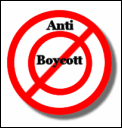 An article in the March 19 edition of the Jerusalem Post reports that Iraqi firms appear to be stepping up their participation in the Arab League Boycott of Israel. The article bases its report on figures contained in the 2006 Annual Report of the Bureau of Industry and Security:
An article in the March 19 edition of the Jerusalem Post reports that Iraqi firms appear to be stepping up their participation in the Arab League Boycott of Israel. The article bases its report on figures contained in the 2006 Annual Report of the Bureau of Industry and Security:
In its recently released annual report for 2006, the US Commerce Department’s Bureau of Industry and Security noted that there had been 31 cases in which the Iraqi government had engaged in restrictive trade practices last year.
In 2005, according to the previous year’s report, there were a total of just eight such cases involving Iraq.
. . .
It was unclear why Iraq began enforcing the Arab boycott of Israel more energetically last year. However, the Iraqi government sent an official representative to take part in the annual meeting of international liaison officers of the Arab League boycott Office in Damascus last May.
The aim of the meeting was to discuss ways of intensifying the trade embargo against the Jewish state.
When the Jerusalem Post contacted the U.S. Embassy in Tel Aviv about this increase, the Embassy only said that it was “disappointed” in this and anticipated that it would raise the issue again with Iraqi officials.
Although it seems likely that Iraqi boycott activity has increased, the BIS reports don’t fully support the figures cited by the Jerusalem Post. First, the BIS tables on Iraqi boycott activity are inconsistent. One table (Appendix E-3) cites 31 reports of boycott activity by Iraq between October 2005 and September 2006 while another (Appendix E-4) shows 26 reports during the same period. The tables do not explain the reason for this inconsistency.
Second, the figures given by BIS are reports of boycott requests, and there may be multiple reports of the same boycott request, e.g., by both the exporter and the freight forwarder. In the 2005 Annual Report, footnote 1 to both Appendix E-3 and Appendix E-4 stated:
All figures are enhanced to the extent that an exporter and one or more other organizations reports on the same transaction.
The 2006 Annual Report contains the footnote number but the footnote text has, inexplicably, gone missing. (Does anyone edit documents at BIS before they are released?) Presumably, however, the footnote was intended to reference the same text as in 2005.

 Posted by
Posted by  Category:
Category: 

 BIS issued the first anti-boycott penalty of the year last week to the
BIS issued the first anti-boycott penalty of the year last week to the  An
An 

